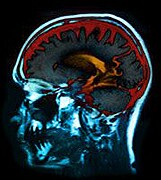Second study suggests new immunotherapy may benefit patients with glioblastoma
MONDAY, June 1, 2015 (HealthDay News) — Targeted radiation in the treatment of brain metastases leads to less cognitive damage than radiation for the entire brain, while survival is similar, researchers reported Sunday at the annual meeting of the American Society of Clinical Oncology, held from May 29 to June 2 in Chicago. In a second study, researchers report that early trials of a new form of gene therapy may give hope to patients battling glioblastoma.
In the first study, 213 patients with cancer that had metastasized to the brain received radiosurgery, and then about half also received follow-up whole-brain radiation therapy. All of the patients had one to three small brain tumors, up to 3 centimeters in width. The researchers found that 92 percent of patients who received whole-brain radiation therapy experienced cognitive decline.
By comparison, only 64 percent of patients who were given targeted radiosurgery experienced cognitive decline. Further, patients who received whole-brain radiation therapy did not live any longer than those who received more targeted radiation, even though they were less likely to experience recurring brain tumors.
The second study involved AdV-Tk therapy, a new gene-mediated cytotoxic immunotherapy. The initial research spanned 2006 to 2010, when the investigators inserted herpes simplex virus DNA into a cold virus. That modified virus was then injected directly into cancerous tissue. In the new clinical trial study, the 48 glioblastoma patients received the gene therapy after undergoing aggressive surgery aimed at reducing the tumor. Each patient was then given the antiviral drug valacylovir. One-year survival rose from 57 to 67 percent, two-year survival rose from 22 to 35 percent, and the number of patients who lived at least three years rose from 8 to 19 percent, the study team found. Overall, average survival improved by about eight months, according to the researchers.
Two authors of the second study disclosed financial ties to Advantagen.
Copyright © 2015 HealthDay. All rights reserved.








